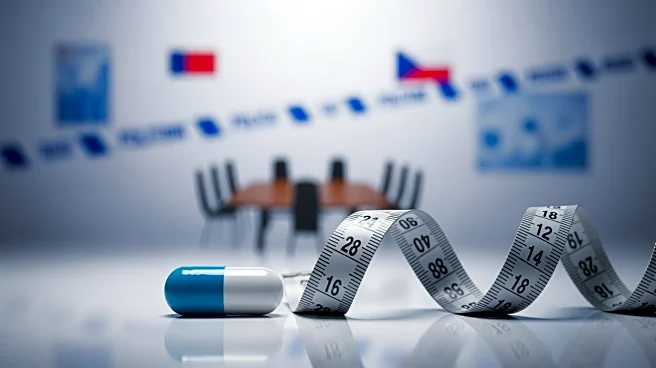What's Happening?
Novo Nordisk has unveiled clinical results from the OASIS 4 trial, showcasing the efficacy of its 25 mg oral formulation of semaglutide. This development follows weaker-than-expected sales of its injectable GLP-1 drugs. The oral semaglutide demonstrated
comparable efficacy to the injectable form, branded as Wegovy, in terms of body weight reduction, cardiometabolic markers, and quality-of-life scores. The trial results, presented at the ObesityWeek conference in Atlanta, Georgia, indicate significant improvements in blood glucose levels, cardiovascular risk factors, and physical function among participants. Novo Nordisk is positioning this oral alternative as a competitive option in the obesity therapy market, which is shifting from injectable to daily oral treatments.
Why It's Important?
The introduction of oral semaglutide by Novo Nordisk represents a significant shift in obesity treatment, potentially broadening access and convenience for patients. This move could impact the pharmaceutical industry by intensifying competition in the GLP-1 drug market, particularly against Eli Lilly's injectable options. The oral formulation may appeal to patients preferring daily pills over weekly injections, potentially increasing market share for Novo Nordisk. Additionally, the positive trial results could influence public health strategies by offering more effective obesity management options, thereby addressing related health issues such as diabetes and cardiovascular diseases.
What's Next?
Novo Nordisk has filed for approval of oral semaglutide in the U.S., with an FDA decision expected by the end of the year. Approval could provide Novo Nordisk a competitive edge in the oral GLP-1 category, ahead of Eli Lilly's anticipated filing for its oral GLP-1 agonist. The company plans to make oral semaglutide available across all sales channels if approved, potentially expanding its consumer base. The outcome of these regulatory decisions will likely influence market dynamics and patient access to obesity treatments.
Beyond the Headlines
The shift to oral GLP-1 therapies could have broader implications for healthcare delivery and patient adherence. Oral medications may improve patient compliance compared to injectables, potentially leading to better health outcomes. This transition also raises questions about the long-term impact on healthcare costs and insurance coverage, as oral treatments may alter pricing structures and reimbursement policies.















